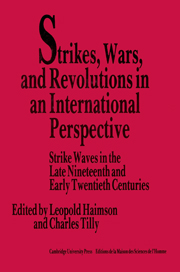 Strikes, Wars, and Revolutions in an International Perspective
Strikes, Wars, and Revolutions in an International Perspective Published online by Cambridge University Press: 25 March 2010
Born at the dawn of the labor movement, the strike remains to this day one of the main forms of proletarian class struggle in capitalist society. At different stages of the labor movement it performed different functions, being remarkably adapted to the solution of the tasks posed by this movement. As a form of worker collective action to counter the intensification of their exploitation by capitalists, strikes connected closely with fluctuations in economic conditions. With the growth of class consciousness of the proletariat, its organization, and the utilization of the strike as a means of political struggle, this connection began to weaken.
The strike cannot resolve the contradiction between labor and capital that engendered it. In the middle of the 1840s, Marx and Engels pointed out that “real strikes in civilized countries are always a subordinate part of the labor movement, because more general combinatioins of workers lead to other forms of actions.”
At the same time, the proletariat's constant employment of the strike in its struggle, the different functions performed by it depending on the aims pursued by this struggle, the ability of the strike movement to reflect the level of workers' class consciousness, the proletariat's role in the solution of pressing social contradictions – all this lends special importance to studying the dynamics of the strike movement in the historical analysis of social relations in the capitalist epoch. Lenin said in 1913 that “the Russian workers' strike movement is the best barometer of the entire nation-wide emancipation struggle in Russia.”
To save this book to your Kindle, first ensure [email protected] is added to your Approved Personal Document E-mail List under your Personal Document Settings on the Manage Your Content and Devices page of your Amazon account. Then enter the ‘name’ part of your Kindle email address below. Find out more about saving to your Kindle.
Note you can select to save to either the @free.kindle.com or @kindle.com variations. ‘@free.kindle.com’ emails are free but can only be saved to your device when it is connected to wi-fi. ‘@kindle.com’ emails can be delivered even when you are not connected to wi-fi, but note that service fees apply.
Find out more about the Kindle Personal Document Service.
To save content items to your account, please confirm that you agree to abide by our usage policies. If this is the first time you use this feature, you will be asked to authorise Cambridge Core to connect with your account. Find out more about saving content to Dropbox.
To save content items to your account, please confirm that you agree to abide by our usage policies. If this is the first time you use this feature, you will be asked to authorise Cambridge Core to connect with your account. Find out more about saving content to Google Drive.